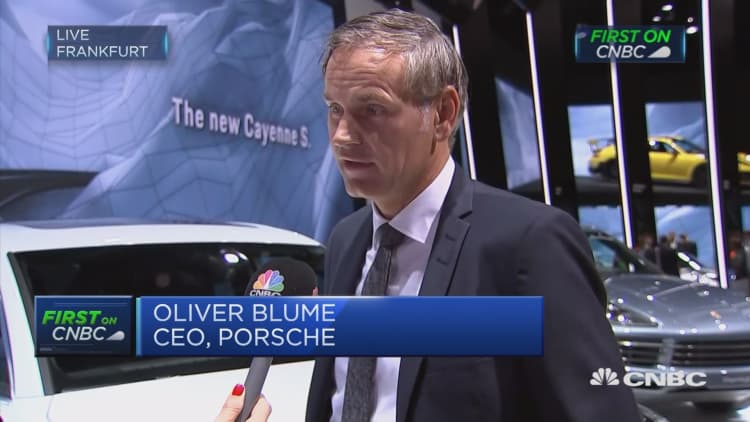Auto Industry Headwinds: The Case Of BMW, Porsche In China

Table of Contents
Intensifying Competition from Domestic Automakers
The rise of Chinese electric vehicle (EV) brands represents a major challenge to established players like BMW and Porsche. Companies such as BYD, NIO, and Xpeng are rapidly gaining market share, leveraging competitive pricing, advanced technology features often exceeding those of established brands, and a strong appeal to national pride among Chinese consumers. This potent combination is directly impacting BMW and Porsche's market position and forcing them to adapt quickly.
- Price wars and discounting impacting profitability: The aggressive pricing strategies of domestic brands are squeezing profit margins, forcing BMW and Porsche to respond with discounts, potentially eroding their premium brand image.
- Loss of market share in specific segments (e.g., luxury EVs): Chinese EV manufacturers are particularly strong in the luxury EV segment, directly competing with BMW's i series and Porsche's Taycan, impacting sales and market share.
- Need for increased localization and partnership strategies: Collaborations with local Chinese companies are becoming increasingly crucial for navigating the complexities of the market and optimizing supply chains for both cost and efficiency.
The Impact of China's Economic Slowdown
China's economic slowdown is significantly impacting consumer spending, particularly on luxury goods like high-end automobiles. Reduced consumer confidence and disposable income are leading to decreased demand for BMWs and Porsches. Fluctuating currency exchange rates further complicate matters, impacting profitability and pricing strategies.
- Reduced consumer demand for high-end vehicles: The economic downturn has led to a decrease in demand for luxury vehicles, forcing brands like BMW and Porsche to focus on alternative market segments or price points.
- Increased pressure to offer financing and incentives: To stimulate sales, BMW and Porsche are under pressure to offer more attractive financing options and incentives, potentially impacting profit margins.
- Challenges in maintaining profit margins: The combined effects of reduced demand and the need for incentives make maintaining profitability a significant challenge in the current economic climate.
Evolving Consumer Preferences and the Rise of EVs
The Chinese automotive market is witnessing a rapid shift towards electric and hybrid vehicles. Consumers are increasingly demanding EVs with advanced features, autonomous driving capabilities, and superior battery technology. This necessitates a substantial acceleration of EV strategies for BMW and Porsche to remain competitive.
- Increased demand for electric vehicles with advanced features: Chinese consumers are early adopters of technology, demanding cutting-edge features in their EVs, putting pressure on established brands to innovate rapidly.
- The need to invest heavily in charging infrastructure: The lack of widespread charging infrastructure in certain regions remains a significant barrier to EV adoption, requiring significant investment from automakers and the government.
- Competition from Chinese EV manufacturers with superior battery technology: Chinese companies are making significant advancements in battery technology, offering longer ranges and faster charging times, directly challenging the technological advantages of established brands.
Regulatory Hurdles and Government Policies
Navigating the Chinese regulatory landscape is a significant challenge for foreign automakers. Stringent emission standards require substantial investments in research and development, while localization requirements impact supply chain management. Trade tensions and political uncertainties further complicate the situation.
- Stricter emission standards requiring significant investments: Compliance with increasingly stringent emission standards necessitates significant investments in new technologies and engine development.
- Localization requirements impacting supply chain management: Government regulations requiring a certain level of local production and sourcing impact supply chain strategies and increase operational complexity.
- Navigating evolving government incentives and regulations: The Chinese government frequently adjusts its incentives and regulations, requiring continuous monitoring and adaptation by automakers.
Overcoming Auto Industry Headwinds in China: A Path Forward for BMW and Porsche
The Chinese automotive market presents significant challenges for BMW and Porsche, including intensified competition, economic slowdown, evolving consumer preferences, and regulatory hurdles. To navigate these auto industry headwinds in China successfully, these brands must adapt their strategies to meet the changing dynamics. This includes increased localization efforts, substantial investment in electric vehicle technology and infrastructure, and a deeper understanding and engagement with Chinese consumer preferences. Continued monitoring of the market and proactive adaptation are crucial for long-term success. The conversation regarding auto industry headwinds in China and their impact on global brands should remain open and ongoing, encouraging further analysis and informed decision-making.

Featured Posts
-
 The Black Hawk Incident Investigating Pilot Rebecca Lobachs Actions Before Collision
Apr 29, 2025
The Black Hawk Incident Investigating Pilot Rebecca Lobachs Actions Before Collision
Apr 29, 2025 -
 La Fire Victims Face Price Gouging By Landlords A Selling Sunset Star Speaks Out
Apr 29, 2025
La Fire Victims Face Price Gouging By Landlords A Selling Sunset Star Speaks Out
Apr 29, 2025 -
 Europe On High Alert Analyzing Recent Russian Military Actions
Apr 29, 2025
Europe On High Alert Analyzing Recent Russian Military Actions
Apr 29, 2025 -
 Kortere Levensduur Bij Adhd Feiten En Fabels Over Levensverwachting Bij Volwassenen
Apr 29, 2025
Kortere Levensduur Bij Adhd Feiten En Fabels Over Levensverwachting Bij Volwassenen
Apr 29, 2025 -
 Nyt Strands Today April 1 2025 Clues Hints And Solutions
Apr 29, 2025
Nyt Strands Today April 1 2025 Clues Hints And Solutions
Apr 29, 2025
